人教版初一英语第五单元
人教版七年级(初中一年级)上册英语第五单元必背课文、单词与语法梳理汇总
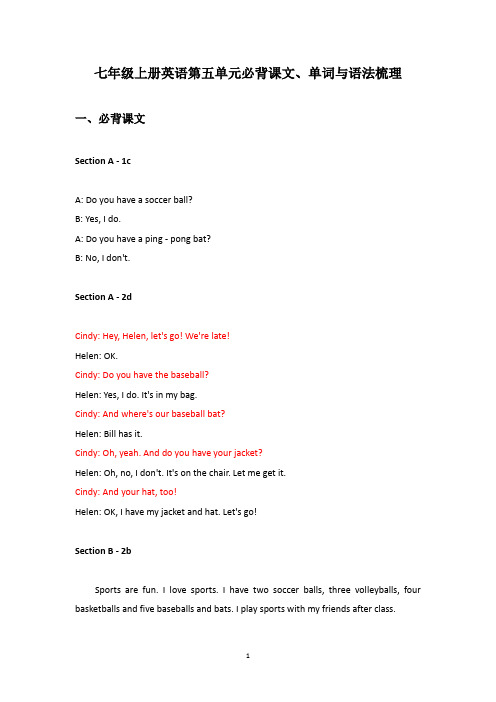
七年级上册英语第五单元必背课文、单词与语法梳理一、必背课文Section A - 1cA: Do you have a soccer ball?B: Yes, I do.A: Do you have a ping - pong bat?B: No, I don't.Section A - 2dCindy: Hey, Helen, let's go! We're late!Helen: OK.Cindy: Do you have the baseball?Helen: Yes, I do. It's in my bag.Cindy: And where's our baseball bat?Helen: Bill has it.Cindy: Oh, yeah. And do you have your jacket?Helen: Oh, no, I don't. It's on the chair. Let me get it.Cindy: And your hat, too!Helen: OK, I have my jacket and hat. Let's go!Section B - 2bSports are fun. I love sports. I have two soccer balls, three volleyballs, four basketballs and five baseballs and bats. I play sports with my friends after class.I love sports, but I don't play them - I only watch them on TV! I like to watch soccer games. Soccer is difficult. I like ping - pong. It's easy for me. I have three ping -pong balls and two ping -pong bats. After class, I play ping -pong with my classmates.二、重点单词1. have:[hæv] v.(第三人称单数形式has)有;吃;喝;经受;经历2. soccer:[ˈsɒkə(r)] n. 足球3. ball:[bɔːl] n. 球;舞会4. soccer ball:足球5. tennis:[ˈtenɪs] n. 网球6. tennis ball:网球7. ping - pong:[ˈpɪŋ pɒŋ] n. 乒乓球8. volleyball:[ˈvɒlibɔːl] n. 排球9. basketball:[ˈbɑːskɪtbɔːl] n. 篮球10. do:[duː](第三人称单数形式does)aux. (用于构成否定句和疑问句等);v. 做;干;构成否定句、疑问句的助动词11. let:[let] v. 让12. us:[ʌs] pron.(宾格)我们13. let's = let us:让我们14. go:[ɡəʊ] v. 去;走;离开;变得;进行15. we:[wiː] pron. 我们(主格)16. late:[leɪt] adj. 迟到;晚的;adv. 晚;迟17. has:[hæz] v. (have的第三人称单数形式)有18. get:[ɡet] v. 去取(或带来);得到;收到;变成;购买;到达19. great:[ɡreɪt] adj. 美妙的;伟大的;很棒的;重大的20. play:[pleɪ] v. 参加(比赛或运动);玩耍;演奏;播放;n. 戏剧;剧本21. sound:[saʊnd] v. 听起来好像;发出声音;n. 声音;音响22. interesting:[ˈɪntrəstɪŋ] adj. 有趣的23. boring:[ˈbɔːrɪŋ] adj. 没趣的;令人厌烦的24. fun:[fʌn] adj. 有趣的;使人快乐的;愉快的;n. 乐趣;快乐;玩笑;娱乐活动25. difficult:[ˈdɪfɪkəlt] adj. 困难的;费力的;艰难的26. relaxing:[rɪˈlæksɪŋ] adj. 轻松的;令人放松的27. watch:[wɒtʃ] v. 观看;注视;看守;监视;n. 表;手表28. TV:[ˌtiː ˈviː] n. 电视;电视机(television的缩写)29. same:[seɪm] adj. 相同的;同一的;pron. (和……)同样的事物(或人)30. love:[lʌv] v. 爱;喜欢;n. 爱;热爱;慈爱;爱情31. with:[wɪð] prep. 和……在一起;带有;使用;以;由于32. sport:[spɔːt] n. 体育运动;(某项)体育运动;v. 炫耀;夸示33. them:[ðəm] pron.(宾格)他们;她们;它们三、语法知识点1. 一般现在时(have的用法)-have表示“有”的用法:have在一般现在时中,当主语是第一、二人称(I、you、we、you、they)以及复数名词时,用原形have,如:I have a book.(我有一本书。
英语人教版七年级上册第五单元知识点总结
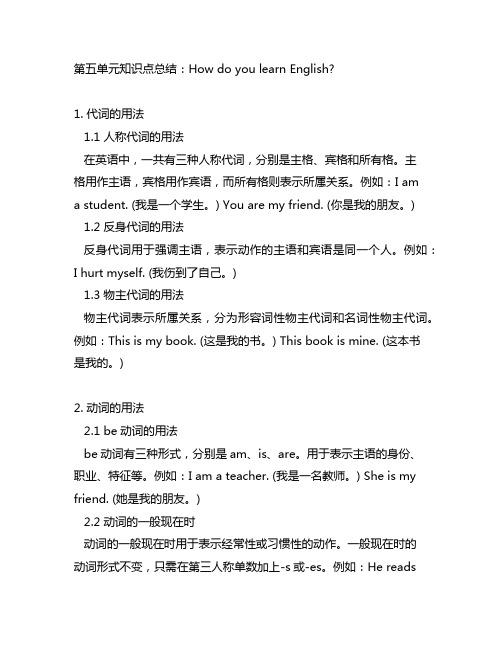
第五单元知识点总结:How do you learn English?1. 代词的用法1.1 人称代词的用法在英语中,一共有三种人称代词,分别是主格、宾格和所有格。
主格用作主语,宾格用作宾语,而所有格则表示所属关系。
例如:I ama student. (我是一个学生。
) You are my friend. (你是我的朋友。
)1.2 反身代词的用法反身代词用于强调主语,表示动作的主语和宾语是同一个人。
例如:I hurt myself. (我伤到了自己。
)1.3 物主代词的用法物主代词表示所属关系,分为形容词性物主代词和名词性物主代词。
例如:This is my book. (这是我的书。
) This book is mine. (这本书是我的。
)2. 动词的用法2.1 be动词的用法be动词有三种形式,分别是am、is、are。
用于表示主语的身份、职业、特征等。
例如:I am a teacher. (我是一名教师。
) She is my friend. (她是我的朋友。
)2.2 动词的一般现在时动词的一般现在时用于表示经常性或习惯性的动作。
一般现在时的动词形式不变,只需在第三人称单数加上-s或-es。
例如:He readsbooks every day. (他每天都看书。
) She plays basketball on weekends. (她周末打篮球。
)3. 句型的用法3.1 肯定句、否定句、疑问句在英语中,肯定句的结构是主语+谓语+其他,否定句的结构是主语+助动词+否定词+谓语+其他,疑问句的结构是助动词+主语+谓语+其他。
例如:She is a student. (她是一个学生。
) She is not a teacher. (她不是一名老师。
) Is she a doctor? (她是医生吗?)4. 数词的用法4.1 基数词和序数词基数词用来表示数量,而序数词用来表示顺序。
例如:There are ten students in the classroom. (教室里有十个学生。
人教版 七年级上册 英语知识点 全 第五单元unit 5 知识点
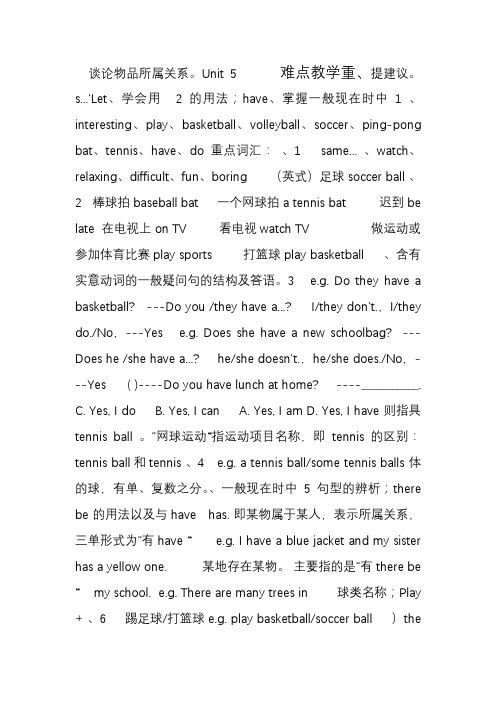
谈论物品所属关系。
Unit 5难点教学重、提建议。
s...’Let、学会用2的用法;have、掌握一般现在时中 1 、interesting、play、basketball、volleyball、soccer、ping-pong bat、tennis、have、do重点词汇:、1 same... 、watch、relaxing、difficult、fun、boring (英式)足球soccer ball 、2 棒球拍baseball bat 一个网球拍a tennis bat 迟到be late 在电视上on TV 看电视watch TV 做运动或参加体育比赛play sports 打篮球play basketball 、含有实意动词的一般疑问句的结构及答语。
3 e.g. Do they have a basketball? ---Do you/they have a...? I/they don’t.,I/they do./No,---Yes e.g. Does she have a new schoolbag? ---Does he /she have a...? he/she doesn’t.,he/she does./No,---Yes ( )----Do you have lunch at home? ----___________. C. Yes, I do B. Yes, I can A. Yes, I am D. Yes, I have 则指具tennis ball 。
”网球运动“指运动项目名称,即tennis的区别:tennis ball和tennis 、4 e.g. a tennis ball/some tennis balls 体的球,有单、复数之分。
、一般现在时中5 句型的辨析;there be 的用法以及与have has. 即某物属于某人,表示所属关系,三单形式为”有have “ e.g. I have a blue jacket and my sister has a yellow one. 某地存在某物。
最全面人教版七年级上册英语第五单元知识点归纳总结
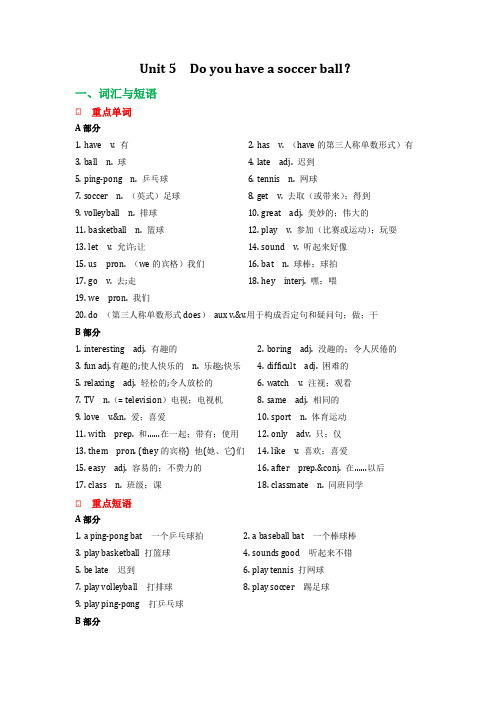
Unit 5 Do you have a soccer ball?一、词汇与短语● 重点单词A部分1.have v. 有2.has v. (have的第三人称单数形式)有3.ball n. 球te adj. 迟到5.ping-pong n. 乒乓球6.tennis n. 网球7.soccer n. (英式)足球8.get v. 去取(或带来);得到9.volleyball n. 排球10.great adj. 美妙的;伟大的11.basketball n. 篮球12.play v. 参加(比赛或运动);玩耍13.let v. 允许;让14.sound v. 听起来好像 pron. (we的宾格)我们16.bat n. 球棒;球拍17.go v. 去;走18.hey interj. 嘿;喂19.we pron. 我们20.do (第三人称单数形式does)aux v.&v.用于构成否定句和疑问句;做;干B部分1.interesting adj. 有趣的2.boring adj. 没趣的;令人厌倦的3.fun adj.有趣的;使人快乐的n. 乐趣;快乐4.difficult adj. 困难的5.relaxing adj. 轻松的;令人放松的6.watch v. 注视;观看 n.(= television)电视;电视机8.same adj. 相同的9.love v.&n. 爱;喜爱10.sport n. 体育运动11.with prep. 和……在一起;带有;使用12.only adv. 只;仅13.them pron. (they的宾格) 他(她、它)们14.like v. 喜欢;喜爱15.easy adj. 容易的;不费力的16.after prep.&conj. 在……以后17.class n. 班级;课18.classmate n. 同班同学● 重点短语A部分1.a ping-pong bat 一个乒乓球拍2.a baseball bat 一个棒球棒3.play basketball 打篮球4.sounds good 听起来不错5.be late 迟到6.play tennis 打网球7.play volleyball 打排球8.play soccer 踢足球9.play ping-pong 打乒乓球B部分1.play computer games 玩电脑游戏2.play volleyball 打排球3.go to the same school 上同一所学校4.watch TV 看电视5.sound interesting 听起来很有趣6.at school 在学校7.with them 和他们一起8.with our friends 和我们的朋友9.watch them on TV 在电视上看它们10.after class 下课后11.watch sports 看体育运动12.in the same school 在同一所学校13.play sth. with sb. 和某人玩某物14.love sports 喜爱运动● 重点句子A部分1.--Do you have a ping-pong bat? --No, I don't.你有一个乒乓球拍吗?不,我没有。
人教版初一英语第五单元作文
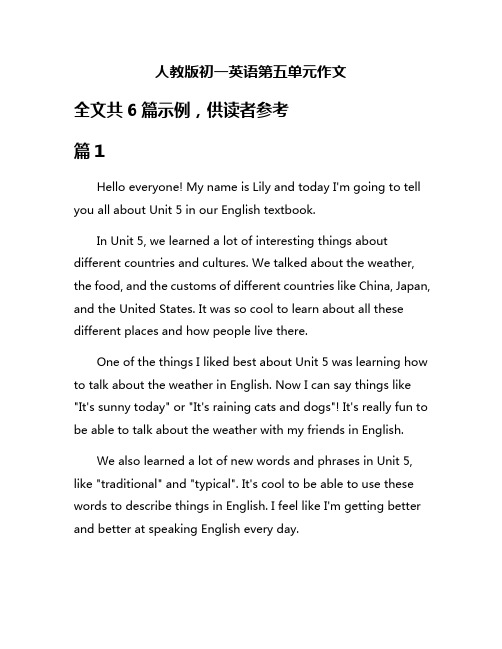
人教版初一英语第五单元作文全文共6篇示例,供读者参考篇1Hello everyone! My name is Lily and today I'm going to tell you all about Unit 5 in our English textbook.In Unit 5, we learned a lot of interesting things about different countries and cultures. We talked about the weather, the food, and the customs of different countries like China, Japan, and the United States. It was so cool to learn about all these different places and how people live there.One of the things I liked best about Unit 5 was learning how to talk about the weather in English. Now I can say things like "It's sunny today" or "It's raining cats and dogs"! It's really fun to be able to talk about the weather with my friends in English.We also learned a lot of new words and phrases in Unit 5, like "traditional" and "typical". It's cool to be able to use these words to describe things in English. I feel like I'm getting better and better at speaking English every day.I really enjoyed learning about different countries and cultures in Unit 5. It's so interesting to see how people live in other parts of the world. I can't wait to learn more about different countries in the next unit!That's all for my essay about Unit 5. I hope you enjoyed reading it. Thank you for listening! Bye bye!篇2Hello everyone! Today, I'm going to tell you about Unit 5 in our textbook. This unit is all about "My Future Plans". It's super interesting and I can't wait to share with you all the cool things we learned!In this unit, we learned how to talk about what we want to be when we grow up. There are so many options, like a doctor, a teacher, a scientist, or even an astronaut! We also learned how to talk about our dream jobs and what we need to do to achieve our goals.One of the most fun things we did in this unit was to write about our future plans. We had to think about what we want to do when we grow up and why. Some of my classmates want to be singers or soccer players, while others want to be artists or chefs. It was so cool to hear about everyone's dreams and goals.We also practiced talking about our future plans in English. It was a bit challenging at first, but with lots of practice and help from our teacher, we all got better at it. Now, we can confidently talk about what we want to be in the future!Overall, Unit 5 was really fun and inspiring. It made me think about my own future and what I want to achieve. I can't wait to see what the future holds for me and all my classmates. I'm excited to keep working towards my goals and dreams!That's all for now. I hope you enjoyed hearing about Unit 5. Bye for now!篇3Title: My Experience in Unit 5 of People's Education Press Grade 7 EnglishHello everyone! I'm excited to share with you my experience in Unit 5 of People's Education Press Grade 7 English. In this unit, we learned about different countries and their cultures, which was super fun and interesting.First of all, we studied about Canada. Did you know that Canada is famous for maple syrup and ice hockey? I also learned that the Canadian flag has a maple leaf on it, which is theirnational symbol. We also learned about the beautiful Niagara Falls in Canada. It was amazing to see the pictures of such a majestic waterfall.Next, we talked about Japan. I found it really cool that Japan has cherry blossom festivals in spring. The pictures of cherry blossoms were so pretty! We also learned about sushi and origami in Japan. I tried making an origami crane and it was so much fun. I hope I can visit Japan one day and see all these amazing things in person.Lastly, we learned about Australia. Kangaroos, koalas, and the Great Barrier Reef are some of the things that make Australia unique. I was fascinated by the pictures of the colorful coral reefs in the Great Barrier Reef. It made me want to go snorkeling and see all the beautiful sea creatures.In conclusion, I had a blast learning about different countries in Unit 5 of People's Education Press Grade 7 English. It's so cool to learn about places I've never been to before. I can't wait to see what we'll learn next! Thank you for reading about my experience, see you next time! Bye!篇4Title: My Wonderful Day in Unit 5Hi everyone! Today I want to share with you about my day in Unit 5 of the People's Education Press English textbooks. It was super fun and I can't wait to tell you all about it!In Unit 5, we learned a lot of cool things about different countries and cultures. We talked about food, clothes, and customs of people in different parts of the world. It was so interesting to learn about how people live in other countries!One of my favorite things we learned about was traditional Chinese festivals. We got to make paper lanterns and learn about the customs of the Chinese New Year. It was so much fun!We also learned about famous landmarks around the world, like the Eiffel Tower in Paris and the Great Wall of China. I want to visit all of these places someday and see them for myself!In Unit 5, we also practiced our English skills by writing short essays and giving presentations. I was a little nervous at first, but my classmates were so supportive and cheering me on. It felt great to share my thoughts and ideas with everyone!Overall, my day in Unit 5 was amazing. I learned so much and had a great time with my friends. I can't wait to see what we learn next in our English class. Thank you for listening to my story! See you next time! Bye!篇5Title: My Favorite SeasonHey guys, do you know what my favorite season is? It's spring! I just love everything about spring - the flowers blooming, the birds chirping, and the warm sunshine. Let me tell you all about it!In spring, the weather starts to get warmer after the cold winter. I can finally put away my heavy coat and wear my favorite t-shirt and shorts. The sun shines brightly in the sky, and I can spend more time playing outside with my friends. We love to ride bikes, have picnics, and play games in the park.One of the best things about spring is all the beautiful flowers that bloom. The cherry blossoms, daffodils, and tulips are so colorful and pretty. I like to pick some flowers and put them in a vase in my room. The sweet scent of the flowers fills the air and makes me feel happy.Another thing I love about spring is seeing all the baby animals. I see little chicks, bunnies, and lambs running around in the fields. They are so cute and playful. Sometimes I go to the farm with my family to pet the baby animals and feed them.In spring, everything feels new and fresh. I feel so alive and full of energy. I can't wait for spring to come every year because it brings so much joy and happiness. Spring is definitely my favorite season!So, what's your favorite season? Let me know in the comments below! Bye for now!篇6Hello everyone! Today I want to talk about the fifth unit in our English textbook. It's all about how to talk about our daily routines and activities.In the unit, we learned a lot of useful words and phrases to describe our daily life. For example, we can say "I get up at 7o'clock" or "I have breakfast at 8 o'clock". We can also talk about what we do in the morning, afternoon, and evening. It's really fun to learn all these new words!We also learned how to ask questions about someone else's daily routine. We can say "What time do you get up?" or "Do you have dinner at home?" It's important to be able to understand and talk about other people's routines too.I think it's great that we are learning how to talk about our daily life in English. It's a useful skill to have, and it's fun to be able to communicate with people from different countries. I can't wait to keep learning more in our English class!That's all for now. I hope you enjoyed my little summary of the fifth unit in our English textbook. See you next time!。
七年级英语上册(人教版)Unit5单元整体说课稿

一、教材分析
(一)内容概述
人教版七年级英语上册Unit 5主要围绕“My family and friends”展开,通过介绍家庭成员和朋友,让学生学习并掌握与家庭成员和朋友相关的词汇和表达方式,同时学习一般现在时态。此单元在整个课程体系中处于第二单元,紧接第一单元的“Hello, my name is...”,进一步加深学生对英语日常交流的理解和运用。主要知识点包括家庭成员和朋友的相关词汇,如mother, father, sister, brother, friend等;一般现在时态的构成和用法,如I like watching movies, She is a teacher等。
3.情感态度与价值观:培养学生对家庭成员和朋友的关爱和尊重,增强学生的人际交往能力,提高学生对英语学习的兴趣和积极性。
(三)教学重难点
1.教学重点:本节课的教学重点是一般现在时态的构成和用法,以及家庭成员和朋友的相关词汇。学生需要掌握一般现在时态的肯定句、否定句和疑问句的构成,并能运用所学词汇和句型进行实际交流。
(三)巩固练习
为了帮助学生巩固所学知识并提升应用能力,我计划设计以下巩固练习和实践活动:
1.小组讨论:学生分组讨论自己的家庭成员和朋友,用英语进行介绍和描述,并练习运用一般现在时态。
2.角色扮演:学生分组进行角色扮演,模拟真实场景,用英语介绍家庭成员和朋友,并尝试运用一般现在时态。
3.练习题:设计一些练习题,让学生在纸上完成,检测他们对家庭成员和朋友词汇和一般现在时态的掌握情况。
为了激发学生的学习兴趣和动机,我将采取以下策略或活动:
1.通过图片、视频等直观教具展示家庭成员和朋友的情景,引发学生的好奇心和兴趣。
七年级上册英语单词第五单元单词

七年级上册英语单词第五单元单词人教版七年级上册英语第五单元单词。
一、单词。
1. have /hæv; həv/ (v.)(有)2. soccer /'sɒkə(r)/ (n.)(英式足球)3. ball /bɔːl/ (n.)(球)4. soccer ball(英式足球)5. tennis /'tenɪs/ (n.)(网球)6. racket /'rækɪt/ (n.)(球拍)7. tennis racket(网球拍)8. ping - pong /'pɪŋpɒŋ/ (n.)(乒乓球)9. volleyball /'vɒlibɔːl/ (n.)(排球)10. basketball /'bɑːskɪtbɔːl/ (n.)(篮球)11. do /duː; də/ (v.)(用于构成否定句和疑问句;做;干;构成否定句和疑问句的助动词无意义)12. let /let/ (v.)(让)13. us /ʌs/ (pron.)(我们(宾格))14. let's = let us(让我们(一起))15. go /gəʊ/ (v.)(去;走)16. we /wiː/ (pron.)(我们)17. late /leɪt/ (adj.)(迟到)18. has /hæz; həz/ (v.)(have的第三人称单数形式)(有)19. get /get/ (v.)(去取(或带来);得到)20. great /greɪt/ (adj.)(美妙的;伟大的)21. play /pleɪ/ (v.)(参加(比赛或运动);玩耍)22. sound /saʊnd/ (v.)(听起来好像)23. interesting /'ɪntrəstɪŋ/ (adj.)(有趣的)24. boring /'bɔːrɪŋ/ (adj.)(没趣的;令人厌烦的)25. fun /fʌn/ (adj.)(有趣的;使人快乐的;n. 乐趣;快乐)26. difficult /'dɪfɪkəlt/ (adj.)(困难的)27. relaxing /rɪ'læksɪŋ/ (adj.)(轻松的)28. watch /wɒtʃ/ (v.)(注视;观看)29. TV /ˌtiːˈviː/ (n.)(电视;电视机 = television)30. watch TV(看电视)31. same /seɪm/ (adj.)(相同的)32. love /lʌv/ (v. & n.)(爱;喜爱)33. with /wɪð/ (prep.)(和……在一起;带有;使用)34. sport /spɔːt/ (n.)(体育运动)35. them /ðem/ (pron.)(他(她、它)们(宾格))。
人教版英语七年级上册第五单元

人教版英语七年级上册第五单元的单词表Unit 5club/klʌb/n.俱乐部;社团join/dʒɔɪn/v.参加;加入choose/tʃuːz/v.选择;挑选drama/'drɑːmə/n.戏剧;戏剧表演play Chinese chess/pleɪˌtʃaɪˈniːz tʃes/下中国象棋feeling/'fiːlɪŋ/n.感觉;情感news/njuːz/n.消息;新闻musical/'mjuːzɪkl/adj.音乐的;有音乐天赋的musical instrument/'mjuːzɪkl ˈɪnstrəmənt/乐器exactly/ɪɡ'zæktli/adv.正是如此;准确地drum/drʌm/n.鼓ability/ə'bɪləti/n.能力;才能paint/peɪnt/v.用颜料画;在……上刷油漆;n.油漆;涂料climb/klaɪm/v.攀登;爬more/mɔː(r)/adj.&pron.更多(的)act/ækt/v.扮演;行动;n.(戏剧等)一幕;行动act out/ækt aʊt/表演at home/ət ˈhoʊm/在家里interested/'ɪntrəstɪd/adj.感兴趣的;关心的;有利害关系的;表现出兴趣的interested in/ˈɪntrəstɪd ɪn/对……感兴趣nature/'neɪtʃə(r)/n.自然界;大自然beef/biːf/n.牛肉soon/suːn/adv.不久;很快than/ðən/prep.&conj.(用以引出比较的第二部分)比more than/mɔːr ðæn/多于mind/maɪnd/n.头脑;心思fall/fɔːl/v.&n.进入;掉落;跌倒;n.(美式)秋天fall in love with/fɔːl ɪn lʌv wɪð/爱上take photos/teɪk ˈfoʊˌtoʊz/拍照take a photo/teɪk ə ˈfoʊtoʊ/拍照collect/kə'lekt/v.收集;采集insect/'ɪnsekt/n.昆虫discover/dɪ'skʌvə(r)/v.发现;发觉wildlife/'waɪldlaɪf/n.野生动物;野生生物Linda/'lɪndə/琳达Alice/ˈælɪs/爱丽丝Bill/bɪl/比尔White/waɪt/怀特Jenny/'dʒeni/珍妮。
- 1、下载文档前请自行甄别文档内容的完整性,平台不提供额外的编辑、内容补充、找答案等附加服务。
- 2、"仅部分预览"的文档,不可在线预览部分如存在完整性等问题,可反馈申请退款(可完整预览的文档不适用该条件!)。
- 3、如文档侵犯您的权益,请联系客服反馈,我们会尽快为您处理(人工客服工作时间:9:00-18:30)。
difficult
interestingFra bibliotekboring
fun
2a Listen and check(√) the words that you hear in 1a.(听录音 从活动 中勾出 听录音,从活动 听录音 从活动1a中勾出 你听到的单词.) 你听到的单词
1. interesting______
√ 3. fun___________ √ 4. difficult_______ √
5. relaxing_______
√
2. boring_________
P28
Listen again and fill in the blanks.(再听一遍录 再听一遍录 音,并填空 并填空.) 并填空
A: Let’s play computer games! B: That sounds(1) __________, but I don’t have a interesting computer. A: Well, do you have a volleyball? B: Yes. A: Then let’s play volleyball. B: Oh, volleyball is so(2)_________..... difficult A: Ok, let’s watch TV. boring B: That sounds(3)_________. Hmmm…Let’s play soccer! Do you have a soccer ball? A: No, I don’t. B: Oh. Well, do you have a basketball? A: Yes, I do. Let’s play basketball. B: That sounds(4)___________. fun
1a Match the words with the pictures.(将下列单词 将下列单词 与图片匹配) 与图片匹配
e 1.interesting c 3.fun__ 5.relaxing a . b 2.boring d 4.difficult ____.
Let’s do
P28
Talking I think it’s…
Unit 5
Do you have a soccer ball?
(Section B 1a-2c)
古楼中学 李雅琴
Teaching aims:
1),New words: interesting/ boring/fun/difficult/relaxing 2),Speaking practice. 3),Language goal: Make suggestions Let’s play computer games. That sounds interesting.
A: Let’s play… B: That sounds interesting/fun/ relaxing/boring/difficult.
play volleyball
play basketball
play soccer ball
Game: 猜一猜图片所表达的是哪一
个形容词?
relaxing
watch TV
Let’s watch TV.
That sounds good./ That sounds boring./ …
Play basketball
Let’s play basketball.
That sounds fun/ difficult/boring/…
Pair work: ask and answer(根据图片,两人练习对话:)
difficu /’difikəlt/困难的 困难的 lt
It’s difficult.
fun
/fʌn/有趣的,令人愉快的 ʌ
Haha, it’s fun.
Let’s read:
fun 有趣的,令人愉快的 interesting 有趣的,令人感兴趣的 relaxing 轻松的 difficult 困难的 boring 无聊的,令人生厌的
interesting
/’intristiŋ/有趣的,令
Woo! It’s interesting.
人感兴趣的
Ah! It’s relaxing.
relaxing
/’rilæksiŋ/轻松的
……报告会 报告会
啊…… 这个…… 这个
boring
/’bɔ:riŋ/无 ɔ 无 聊的
Hm. It’s boring.
P85
Homework:
1).Review the new words;
1.interesting 2.fun 3.relaxing 4.difficult 5.boring 2).Practice the conversations. A: Let’s …. B: That sounds ….
更多资源 更多资源
